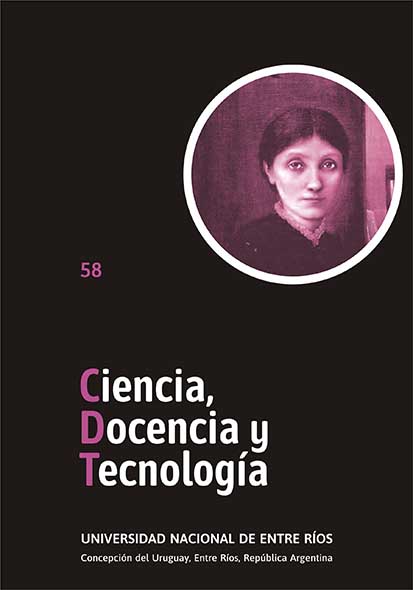Abstract
This paper presents the results of an assessment of the level of appropriation of ICT, as generators of educational innovation, by teachers of two Faculties of the Universidad of Los Andes, based on the Adell´s appropriation model (2008). Information gathered indicates that teachers of both schools are located on level three (3) of appropriation (Adaptation), which means that even when they possess a certain level of knowledge and make use of ICT, do not get to customize its use according to their needs and incorporate strategies oriented to cooperative and interdisciplinary work, project-based and product development contexts.
References
ADELL, J. (2008). Competencia digital de los profesores. Recuperado de www.youtube.com/watch?feature=player_embedded&v=sLLlwJcQ--Y
AFANADOR, H. (2015). Diagnóstico sobre el uso y apropiación de TIC en docentes de la Secretaría de Educación Distrital. Recuperado de http://reposital.cuaed.unam.mx:8080/jspui/handle/123456789/3733
CARRILLO, D. (2015). Competencias TIC de los docentes para la enseñanza mediante entornos virtuales en educación superior. El caso de la Universidad de Los Andes-Venezuela: evaluación y diseño de un plan de formación. Tesis Doctoral. Universitat Rovira I Virgili, Tarragona, España. Recuperado de http://www.tdx.cat/handle/10803/285330
COLÁS, P., RODRÍGUEZ, M. & JIMÉNEZ, R. (2005). Evaluación de e-learning. Indicadores de calidad desde el enfoque sociocultural. Recuperado de http://campus.usal.es/~teoriaeducacion/rev_numero_06_2/n6_02_art_colas_rodriguez_jimenez.html
GONZÁLEZ, A. & DE PABLOS, J. (2015). Factores que dificultan la integración de las TIC en las aulas. Revista de Investigación Educativa, 33(2), 401-417.
GUTIÉRREZ, I. (2011). Competencias del profesorado universitario en relación al uso de tecnologías de la información y la comunicación: análisis de la situación en España y propuesta de un modelo de formación. Tesis Doctoral. Universidad Rovira i Virgili. Tarragona-España. Recuperado de http://www.tdx.cat/handle/10803/52835
HOOPER, S. & RIEBER, L. P. (1995). Teaching with technology. En A. C. Ornstein (Ed.), Teaching: Theory into practice, (pp. 154-170). Needham Heights, MA: Allyn and Bacon.
ISTE. (2008). NETS for Teachers: National Educational Technology Standards for Teachers, Second Edition, 2008, ISTE (International Society for Technology in Education). Recuperado de http://www.iste.org/docs/pdfs/nets-for-teachers-2008_spanish.pdf?sfvrsn=2
MCKENZIE, W. (2005). Becoming a Technoconstructivist. On Cue, Spring 2005. 21-23.
PONS, J. de P. (2007). El cambio metodológico en el Espacio Europeo de Educación Superior y el papel de las tecnologías de la información y la comunicación. RIED. Revista Iberoamericana de Educación a Distancia, 10(2). 15-44
RED.ES. (2008). Memorias del Congreso Nacional Internet en el Aula «La importancia de las TIC en las aulas». España: Ministerio de Industria, Energía y Turismo (MINETUR).
RUEDA, E. (2009). Los adultos y la apropiación de tecnología. Un primer acercamiento, Mediaciones Sociales. Revista de Ciencias Sociales y de la Comunicación, 4, primer semestre de 2009. 329-354. Universidad Complutense de Madrid. Recuperado de http://www.ucm.es/info/mediars
SALINAS, J. (2004). Innovación docente y uso de las TIC en la enseñanza universitaria. Revista Universidad y Sociedad del Conocimiento, 1(1). 1-16.
SIGALÉS, C. (2004). Formación universitaria y TIC: nuevos usos y nuevos roles. Revista Universidad y Sociedad del Conocimiento
UNESCO (2002). Information and Communication Technology in Education. A Curriculum for Schools and Programme of Teacher Development. Recuperado de http://unesdoc.unesco.org/ulis/cgi-bin/ulis.pl?catno=129538&gp=1&mode=e&lin=1
UNESCO (2011). Unesco ICT competency framework for teachers. Paris-France. Recuperado de http://www.unesco.org/new/en/communication-and-information/resources/publications-and-communication-materials/publications/full-list/unesco-ict-competency-framework-for-teachers/
VÁZQUEZ, J. (2015). Nuevos escenarios y tendencias universitarias. Revista de Investigación Educativa, 33(1), 13-26.
The authors retain the copyright and grant the journal the right to be the first publication of the work, as well as licensing it under a Creative Commons Attribution License that allows others to share the work with an acknowledgment of the authorship of the work and publication initial in this magazine. All content is published under the Creative Commons 4.0 international license: Attribution-Non-Commercial-Share Alike.

